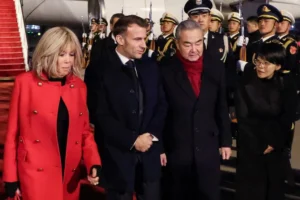
What connects a battlefield in Afghanistan, a closed-door meeting in Washington, and a single word from Donald Trump? At first glance, nothing. However, recent events suggest a deeper, far more calculated web of geopolitics is at play, one where minerals, military bases, and subtle nods could reshape the balance of power in Asia. In today’s episode of DNA, Rahul Sinha, Managing Editor of Zee News, conducted a detailed analysis of a fast-developing situation involving Pakistan’s military actions in Afghanistan, and the growing speculation around US President Donald Trump’s role in it.
Watch Here:
#DNAWithRahulSinha | अफगान पर पाकिस्तानी अटैक के पीछे ट्रंप? तालिबान Vs पाकिस्तान..’महायुद्ध’ का विश्लेषण#DNA #Taliban #Afghanistan #Pakistan #USA @RahulSinhaTV pic.twitter.com/hZ3KN9DdaR
— Zee News (@ZeeNews) October 18, 2025
Add Zee News as a Preferred Source
The timing has raised eyebrows. Just as the Pakistan Air Force launched airstrikes inside Afghan territory, Pakistan’s Navy Chief, Admiral Naveed Ashraf, was on an official visit to the United States. Pakistani authorities claim his meetings were with American military officials, but reliable sources suggest that he also held discussions with individuals close to Donald Trump.
This unusual coincidence has sparked questions both inside and outside Pakistan. Is it possible that Trump influenced or encouraged Pakistan to violate the ceasefire with Afghanistan? Veteran Pakistani journalist Imran Riaz has openly questioned the motive behind the strikes and hinted at foreign influence.
Adding fuel to the speculation, Trump commented on the matter by saying, “I understand,” in reference to Pakistan’s attack. What stood out was his lack of criticism, not a single word of disapproval or advice to Pakistan for breaching the peace. This silence, many believe, points to a deeper connection between Trump and Pakistan’s military establishment.
Back on 8 October, DNA had reported how the Taliban refused to hand over the Bagram Airbase to the United States. Within 48 hours, tensions escalated along the Pakistan-Afghanistan border. Analysts now believe that the refusal of the Taliban may have upset Trump’s broader strategic plans in the region.
Bagram Airbase holds immense importance in Washington’s military strategy. Its proximity to China’s Xinjiang region makes it an ideal location to monitor Chinese nuclear facilities. It also offers a gateway for US influence in Central Asia and leverage against Iran. According to sources, Trump had envisioned Bagram as a fortress to extend American reach across Asia. The Taliban’s denial, however, threw a wrench into those plans.
Field Marshal Asim Munir, considered close to Trump, is now under scrutiny. Was the Afghan strike a pressure tactic to force the Taliban to reconsider their position on Bagram? This possibility cannot be ignored.
Beyond military interests, Trump also has his eyes on Afghanistan’s rare earth minerals. These include lanthanum (used in batteries), neodymium (vital for high-strength magnets), and samarium (used in nuclear reactors). Rich reserves of these minerals lie in Afghanistan’s Helmand province and southern regions.
China’s decision to restrict mineral exports to the US due to trade tensions has severely impacted American industries. On 28 September, Field Marshal Munir reportedly showcased samples of key minerals to Trump, following which a deal was discussed. But Pakistan cannot supply these resources in large quantities, making Afghanistan’s mineral wealth a crucial alternative.
However, yet again, Trump’s ambitions met a roadblock. During his recent visit to India, Afghan Foreign Minister Amir Khan Muttaqi announced that the Taliban would prefer Indian investment and trade for its mineral resources. This move sidestepped both Pakistan and the US.
The sequence of events, the Taliban denying the Bagram base and inviting India for resource trade, has reportedly frustrated Trump. Analysts suggest this may have prompted Pakistan’s military to act aggressively toward Afghanistan, possibly to send a message.
But that’s not where it ends. Without any provocation, Pakistan’s Field Marshal Munir has issued strong statements directed at India. Observers believe these remarks are not just bluster but part of a broader regional strategy.
Afghanistan has already made its position clear; it won’t bow to Pakistan’s pressure. And if Munir attempts to provoke India, the response, as the broadcast concluded, could be more devastating than Operation Sindhur. This unfolding triangle of Trump, Pakistan, and Afghanistan, with India now firmly in the picture, has the potential to redefine power equations across Asia.





